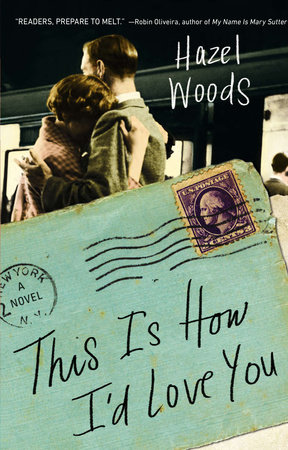This Is How I’d Love You Reader’s Guide
By Hazel Woods


INTRODUCTION
As the Great War rages, an independent young woman struggles to sustain love—and life—through the power of words.
It’s 1917 and America is on the brink of World War I. After Hensley Dench’s father is forced to resign from the New York Times for his anti-war writings, she finds herself expelled from the life she loves and the future she thought she would have. Instead, Hensley is transplanted to New Mexico, where her father has taken a job overseeing a gold mine. Driven by loneliness, Hensley hijacks her father’s correspondence with Charles Reid, a young American medic with whom her father plays chess via post. Hensley secretly begins her own exchange with Charles, but looming tragedy threatens them both, and—when everything turns against them—will their words be enough to beat the odds?
Hazel Woods lives in New Mexico with her husband and two children.
1. What was the inspiration for this novel? What type of research went into writing it?
Actually, the very first bit of inspiration for this novel came from the knowledge that my great-grandfather had played chess via the post, sometimes with partners as far away as Europe. I’m not sure why, but this really sparked a kind of curiosity and longing for the time in our not-so-distant past in which entertainment and communication involved vast amounts of effort and patience. From that spark, came the voices of Hensley and Charles and their desperate plight.
I read my great-grandparents’ courtship letters to get a feel for language and atmosphere. What a treasure trove! I also looked at a lot of photographs from the time period and read about the earliest American troops to serve, most of them through the American Field Service.
2. This Is How I’d Love You oscillates seamlessly between the bloody European warfront and the dry, dusty lands of New Mexico. Did you have particular locales in mind when creating these environments for the reader? Was it difficult to channel these environments through a historical lens?
The town of Hillsboro, New Mexico is the actual place where my great-grandparents settled. That locale was pretty easy to render—I’ve seen lots of photographs from when it was a bustling mining town in the early 1900s. When I was younger, I was lucky enough to drive a bit through France and Germany and that countryside made a lasting impression on my imagination. As I was doing research about the front lines, I imagined all of those beautiful vistas and fields overrun by the machinery and brutality of war.
3. In this age of Facebook, Twitter, and social media, do you think that letter writing is a lost art? What value do you place on handwritten correspondence?
I am absolutely one of those sentimental types who values handwritten correspondence much more than any kind of electronic communication. My husband and I wrote letters for the entire first year of our relationship and I cherish them. I just recently found a couple of letters my father wrote to me when I was away at summer camp the year I was thirteen. It was the 4th of July, and he alternated every letter of the salutation between a red and blue pen. That detail is so charming and sweet. It reveals something that an emoticon never can. Having lost him nearly ten years ago, that piece of paper is a direct, priceless connection to him. I hope I can leave behind similarly unique written artifacts for my children.
4. What other historical periods interest you as a writer?
I think with the right character, I could immerse myself in any time period. It’s human beings that fascinate me most. So, I probably won’t be setting a book in the Cretaceous period, but otherwise, I am interested in all settings.
Just for joining you’ll get personalized recommendations on your dashboard daily and features only for members.
Find Out More Join Now Sign In